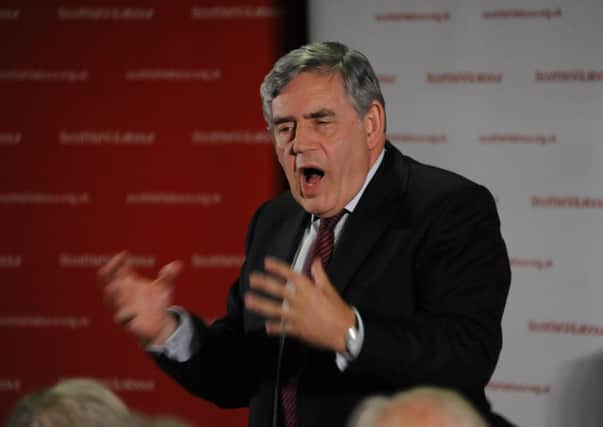Scottish independence: Both sides call for unity


A key architect of Scottish devolution will call for “interdependent independence” - political independence for Holyrood in a more mature relationship with the British Isles.
But former prime minister Gordon Brown and shadow pensions minister Gregg McClymont will call on Scotland’s more mature citizens to vote to keep the United Kingdom together, pledging new powers to help the elderly in the next stage of devolution.
Advertisement
Hide AdAdvertisement
Hide AdToday marks the 17th anniversary of the day Scotland voted Yes to devolution, giving the green light to a Scottish Parliament which just over a decade later voted for another referendum on independence.
With that referendum one week away, Canon Kenyon Wright, chair of the Scottish Constitutional Convention which laid the groundwork for devolution in the 1990s, will call for a Yes vote at a press conference of more than 200 members of the international media.
He will say: “Five years ago I put to the Scottish Government, and to the three unionist parties, the case for a second question - which I wanted to be an autonomous Scotland in a new relationship with what would have to have been a radically reformed UK.
“That door was wide open in Scotland. It was slammed shut by the Prime Minister and the usual suspects.
“Like many who shared that hope, I became convinced that the only way forward for the kind of Scotland I believed in, was independence - or what I prefer to call ‘interdependent independence’. For we are still together in these islands, but as adults, come of age.
“Again and again a Westminster government we did not elect claimed the right to impose policies we rejected and an ideology we do not accept. Devolution has no answer for that.
“The tactics used by No simply prove that they fail to understand how deeply that principle of Scotland’s right is rooted in our history.
Advertisement
Hide AdAdvertisement
Hide Ad“First there was the stick to threaten us. Now the carrot to tempt us.
“First the blackmail - ‘Be naughty and vote Yes and we’ll punish you’. Now the bribe - ‘Be good, vote No and we’ll reward you’.
“First Project Fear - now Project Fantasy - a last desperate attempt to stem the tide.
“Scotland needs something devolution can never give - the secure power to make her own decisions; to follow her own vision of a just fair society, to take her positive place among the nations of Europe and the world, to be free from the constant interference from Westminster.
“I know the powerful will say No - I believe the people will say Yes.”
He will address the event alongside First Minister Alex Salmond, Deputy First Minister Nicola Sturgeon, Anum Qaisar of Muslim Friends of Labour, and Patrick Harvie, co-convener of the Scottish Greens.
Mr Brown will make the case for Scotland staying in the UK at a Better Together rally in Kilmarnock.
Announcing his plans on Monday, Mr Brown said: “As part of my 30 day tour of towns, cities and villages in Scotland, I will show on Thursday when I address a rally of pensioners what our new powers for the Scottish Parliament means for services for the elderly, and the SNP have got it wrong on pensions.”
Advertisement
Hide AdAdvertisement
Hide AdFormer Lib Dem leader Charles Kennedy will also be making the case for Scotland to remain in the UK during a campaign visit in Glasgow.
The latest stage of campaigning comes after it emerged that banking giant Lloyds has put in place contingency plans in case Scotland votes for independence in next week’s referendum. Lloyds Banking Group, which includes Halifax and Bank of Scotland, has plans which including shifting its company registration to England if the Yes campaign wins.
Meanwhile, BBC Scotland is set to host the biggest debate the country has ever seen tonight.
Up to 12,000 first time voters from across Scotland will fill Glasgow’s SSE Hydro for a BBC One televised debate on independence, which will give 16 and 17-year-olds the opportunity to air their views and question politicians.
Every secondary school in Scotland has been invited to take part.